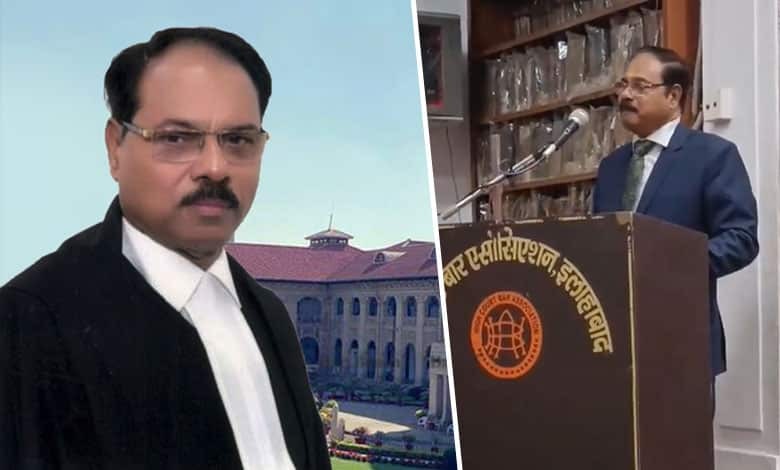The Opposition INDIA bloc parties in the Rajya Sabha, with a total of 85 MPs in the Upper House, are preparing to give a notice for moving a motion to impeach Allahabad High Court judge Justice Shekhar Kumar Yadav, following his controversial remarks at an event organised by the Vishwa Hindu Parishad (VHP) last week. Yadav’s remarks caught on video and available on social media since Monday, December 9 contained hateful and discriminatory remarks against India’s largest religious minority, Muslims.
Of the 85 opposition MPs in the Rajya Sabha, sources have told the media that 36 Opposition MPs cutting across parties have already signed the petition, initiated by Independent Rajya Sabha MP and lawyer Kapil Sibal. The Opposition was, in all likelihood, going to move it on Thursday after organising more signatures. The INDIA bloc needs 50 MPs in the Rajya Sabha to be able to move it.
Among those who have already signed include the Congress’s Digvijaya Singh, Jairam Ramesh and Vivek Tankha; the Aam Aadmi Party’s Sanjay Singh; the Trinamool Congress’s Saket Gokhale and Sagarika Ghose; the RJD’s Manoj Kumar Jha; the Samajwadi Party’s Javed Ali Khan; the CPI(M)’s John Brittas; and the CPI’s Sandosh Kumar.
In the notice, that lays downs the grounds for impeachment, initiation of proceedings for impeachment of Justice Yadav under Section 3(1)(B) of The Judges (Inquiry) Act read with Articles 124(4) and 124 (5) of the Constitution has been demanded. As per the Judges Inquiry Act, 1968, a complaint against a judge has to be made through a resolution signed at least by 100 members if moved in the Lok Sabha and by 50 MPs if initiated in the Rajya Sabha.
Apart from a written text, the INDIA Alliance will, reportedly attach video clips and transcripts of Justice Yadav’s controversial speech along with links of news articles on the same. Procedurally, once the MPs submit the motion, the presiding officer of the House can either accept or reject it. If accepted, a three-member committee comprising two judges and a jurist is constituted to probe the complaint and determine if it is a case fit for initiating the process of impeachment.
The committee normally includes one judge from the Supreme Court and the Chief Justice of a High Court if the complaint is against a High Court judge, or two Supreme Court judges if the complaint is against a sitting judge of the apex court.
Article 124 (4) of the Constitution says the motion for impeachment “has to be supported by a majority of the total membership of that House and by a majority of not less than two-third of the members of the House present and voting” – in both the Lok Sabha and Rajya Sabha.
Given the majority enjoyed by the NDA bloc in both Houses, and the ruling coalition’s brazen support to majoritarian communal politics, the motion of impeachment is unlikely to clear either the Lok Sabha or Rajya Sabha.
In the past, there have been four attempts to impeach High Court judges and two to remove Supreme Court judges, with the last being in 2018 against then Chief Justice of India Dipak Misra. None of the motions cleared the entire process.
Article 124 (4) of the Constitution states, “A Judge of the Supreme Court shall not be removed from his office except by an order of the President passed after an address by each House of Parliament supported by a majority of the total membership of that House and by a majority of not less than two-third of the members of the House present and voting has been presented to the President in the same session for such removal on the ground of proved misbehaviour or incapacity.”
Section 3 of the Judges Inquiry Act, 1968, states: “If notice is given of a motion for presenting an address to the President praying for the removal of a Judge… then, the Speaker (Lok Sabha) or, as the case may be, the Chairman (Rajya Sabha) may, after consulting such persons, if any, as he thinks fit and after considering such materials, if any, as may be available to him, either admit the motion or refuse to admit the same.”
Article 124 (5) says: “Parliament may by law regulate the procedure for the presentation of an address and for the investigation and proof of the misbehaviour or incapacity of a Judge under clause (4)”.
Monday December 9 morning opened to outrage at the video screenings of an event organised by the VHP’s legal cell on the Allahabad High Court premises Sunday, Justice Yadav said: “You can’t disrespect a woman who has been recognised as a goddess in our Shastras and Vedas. You can’t claim the right to have four wives, perform halala, or practice triple talaq. You say, we have the right to say ‘triple talaq’, and not give maintenance to women.” He then made some distasteful and anti-Constitutional remarks on how ‘Hindu children are brought up to be tolerant’ unlike Muslim children where upbringing was to the contrary.
According to a VHP press release, the judge also spoke in favour of the UCC. “Having different Constitutions for people of different communities and religions in a country is no less than a danger to the nation. When we talk of human uplift, it should rise above religion and should be within the ambit of the Constitution… If the interests of a woman are to be protected, whether it is about her wealth, her maintenance, her rightful share in the property, her remarriage, or her freedom to choose a partner, the limits of all these things should be decided within the ambit of one Constitution,” Justice Yadav said.
Related:
Uttarakhand High Court orders security, condemns hate speech over Uttarkashi Mosque
CJP seeks action against BJP leaders for alleged hate speech amid Jharkhand polls

